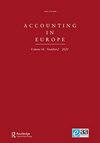Hedge Accounting and its Consequences on Portfolio Earnings – A Simulation Study
IF 4.3
Q1 BUSINESS, FINANCE
引用次数: 2
Abstract
Abstract In this paper, I analyze the consequences of cash flow hedge accounting on portfolio earnings of firms focusing on main changes between IFRS 9 and IAS 39. For this purpose, I develop a simulation study which illustrates the quantitative effects on the accounting entries according to the currently applicable hedge accounting methods. It is especially addressed what accounting differences arise and how these distinctions may affect a firm’s earnings. Furthermore, I examine to which firms early switching becomes especially desirable or burdensome. This information is particularly useful to managers and investors. The paper shows that portfolio earnings are affected differently. In the model, IAS 39 may lead to higher or lower earnings for increasing deviations between foreign and domestic interest rates. Additionally, sensitivity to volatility changes varies among the methods. Moreover, a partly ineffective hedging relationship does not necessarily decrease earnings compared to its fully effective counterpart.套期会计及其对投资组合收益的影响——模拟研究
在本文中,我分析了现金流量套期会计对公司投资组合收益的影响,重点关注IFRS 9和IAS 39之间的主要变化。为此,我进行了一项模拟研究,以说明根据目前适用的套期会计方法对会计分录的定量影响。它特别讨论了会计差异的产生以及这些差异如何影响公司的收益。此外,我研究了哪些公司的早期转换变得特别可取或负担。这些信息对管理者和投资者特别有用。研究表明,投资组合收益受到不同程度的影响。在该模型中,《国际会计准则第39号》可能因外国和国内利率之间的偏差增加而导致收益增加或减少。此外,不同的方法对挥发性变化的敏感性也不同。此外,与完全有效的对冲关系相比,部分无效的对冲关系并不一定会减少收益。
本文章由计算机程序翻译,如有差异,请以英文原文为准。
求助全文
约1分钟内获得全文
求助全文

 求助内容:
求助内容: 应助结果提醒方式:
应助结果提醒方式:


